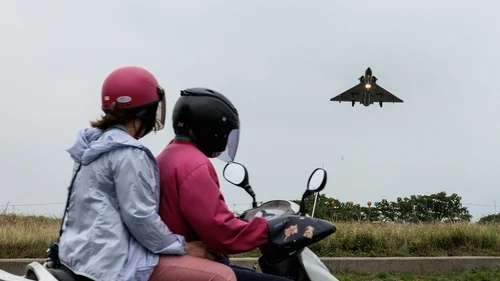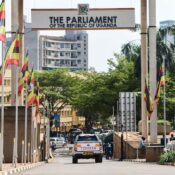
China begins ‘punishment’ war games near Taiwan
China, incensed, began “punishment” drills near Taiwan on Thursday, citing “separatist acts” as justification. State media condemned recently inaugurated President Lai Ching-te as heavily armed jets were launched and simulated strikes were carried out.
Within three days of Lai’s election to the presidency—a man Beijing regards as a “separatist”—exercises in the Taiwan Strait and surrounding groupings of Taiwan-controlled islands near the Chinese coast began.
China, which considers democratically controlled Taiwan to be its own territory, condemned Lai’s inauguration speech on Monday, stating that the two sides of the strait were “not subordinate to each other” and urging China to cease its threats.
Chinese Foreign Minister Wang Yi referred to Lai as “disgraceful” on Tuesday.
Lai has been rejected every time he has offered to hold discussions with China. He opposes Beijing’s claims of sovereignty, saying that only the people of Taiwan can determine their own destiny.
The Chinese People’s Liberation Army (PLA) Eastern Theatre Command announced that at 7:45 a.m. (2345 GMT), combined military drills comprising the army, navy, air force, and rocket force had begun in the Taiwan region.
According to a statement from the command, the drills are being conducted in the Taiwan Strait, the north, south, and east of Taiwan, as well as in the vicinity of the Taiwan-controlled islands of Kinmen, Matsu, Wuqiu, and Dongyin. This is the first time that China’s exercises have encompassed these areas.
According to state media, China launched many fighter jets equipped with real missiles and carried out simulated attacks on strategic military locations using warships.
There were no live fire drills in any regions near Taiwan, according to Taiwan’s defense ministry, but there were 15 Chinese military ships, 16 coast guard vessels, and 33 aircraft participated.
The “Joint Sword – 2024A” drills are scheduled to take place over two days. Different from a similar “Joint Sword” exercise conducted in April of last year, these drills have a “A” marking, meaning that there may be follow-ups.
The defense ministry of Taiwan denounced the exercises, stating that it was certain it could defend its territory and that it had dispatched troops to various parts of the island to track targets with its land-based missile weapons and air defenses.
“The launch of military exercises on this occasion not only does not contribute to the peace and stability of the Taiwan Strait, but it also highlights (China’s) militaristic mentality,” said the ministry.
Taiwan’s presidential office acknowledged that China’s “unilateral military provocations” were endangering the island’s democratic freedoms as well as regional peace and stability, but asserted that Taiwan could secure its security.
At a military facility in Taoyuan, close to Taipei, the capital, Lai declared, “I have faith in the military.” “I also ask all my compatriots to rest assured.”
China’s official broadcaster CCTV declared that China’s actions are “legitimate, legal, and necessary” and that Lai’s inauguration address was “extremely harmful”.
It stated that Lai’s remarks jeopardized stability and peace across the Taiwan Strait and was a confession of a wish for Taiwan independence.
It further stated that Taiwan’s 23 million citizens cannot decide Taiwan’s future; only China’s 1.4 billion people can.
China’s military has been conducting virtually daily exercises in the vicinity of Taiwan for the past four years; the last major war simulations near the island were held in 2023 and 2022.
Rather than a dramatic escalation, a senior Taiwanese source claimed that this time China was effectively “putting a name” on its usual efforts. The individual requested anonymity due to the sensitive nature of the topic.
The official said that part of these drills include emulating attacks on foreign and Taiwanese vessels as well as breaching the median line in the strait, which had previously functioned as an unofficial barrier.
Not a surprise
The exercises were a component of a scenario Taiwan had planned, a second senior Taiwanese official told Reuters.
Prior to the inauguration, representatives from Taiwan had declared that they were monitoring any movements by the Chinese military.
To assess the “joint real combat capabilities” of the forces, China’s military said that the drills center on precision strikes on strategic targets, integrated operations both inside and beyond the island chain, and joint sea-air combat readiness patrols.
“This is also a strong punishment for the separatist acts of Taiwan independence forces and a stern warning against the interference and provocation by external forces,” the commander stated.
A map of the drill zones, which are spread across five regions around Taiwan and the islands Taiwan controls close to China’s coast, was released by the official Chinese media.
These places were outside of Taiwan’s contiguous zone, which is 24 nautical miles from the coast of the main island, according to Taiwan officials who spoke with Reuters.
According to one of the officials, Taiwan has not seen any significant movements of China’s ground and missile troops, nor had China declared any no-fly zones.
The drills would only last two days, but Su Tzu-yun, a research fellow at Taiwan’s premier military think tank, the Institute for National Defense and Security Research, claimed that their scope was significant compared to past exercises, as they encompassed Taiwan’s outlying islands.
According to him, this is intended to show off China’s maritime dominance and deter the involvement of outside forces.
“The political signals here are greater than the military ones,” he stated.
In Taiwan, where people have long been accustomed to Chinese military action, there was no cause for concern. Thursday saw a 0.3% increase in the benchmark index (.TWII), opens new tab, which is presently trading at record highs.
The foreign exchange market was functioning normally, with no unusual inflow or outflow of foreign capital, a central bank official told Reuters.
In August 2022, China began conducting live-fire military drills near Taiwan in response to a visit by former US House Speaker Nancy Pelosi, which Beijing strongly denounced. The four days of the unprecedentedly large-scale training sequence were followed by many days of extra drills.
All Categories
Recent Posts
Tags
+13162306000
zoneyetu@yahoo.com



